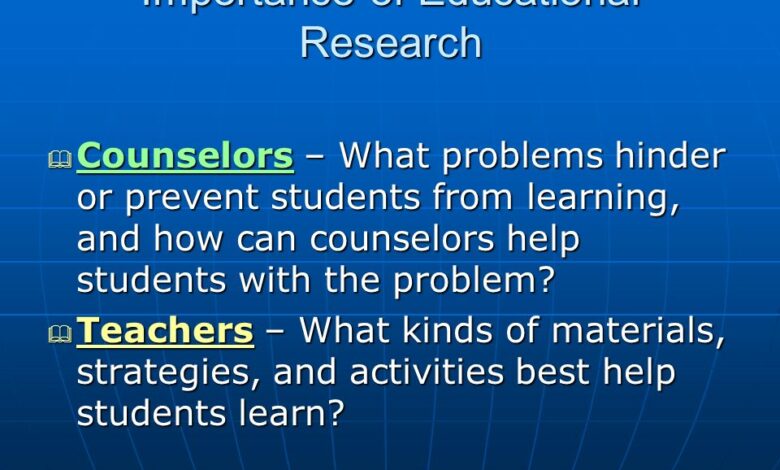The importance of education research

As the world becomes increasingly complex, education is more important than ever. Teachers, administrators, and policymakers all need to be well-informed to provide the best possible education to students. This is where education research comes in – it provides crucial insights into what works and what doesn’t in education. In this article, we’ll explore the importance of education research and how it can help improve student outcomes.
What is Education Research?
Education research is the study of teaching and learning. Researchers use a variety of methods to investigate questions such as:
- What teaching strategies are most effective?
- How can we identify and support struggling students?
- What is the impact of various educational policies and interventions?
Education research is often conducted in schools, but it can also take place in other settings such as museums, libraries, and online learning platforms. Researchers use a variety of techniques including surveys, interviews, observations, and experiments to gather data.
Why is Education Research Important?
Education research is essential for a number of reasons:
1. It Helps Improve Teaching and Learning
By investigating what works and what doesn’t in education, education research can help teachers and administrators make informed decisions about how to improve teaching and learning. For example, research has shown that personalized learning can be effective for many students and that providing students with regular feedback can improve their performance.
2. It Helps Identify and Address Gaps in Education
Education research can also help identify gaps in education and ways to address them. For example, research has shown that students from low-income families are more likely to struggle in school and that interventions such as tutoring and mentoring can be effective in closing the achievement gap.
3. It Informs Educational Policy
Education research can also inform educational policy at the local, state, and national levels. For example, research has informed policies such as the No Child Left Behind Act and the Every Student Succeeds Act, both of which aimed to improve student outcomes.
4. It Helps Prepare Students for the Future
Finally, education research can help prepare students for the future by identifying the skills and knowledge they will need to succeed. For example, research has shown that critical thinking, creativity, and collaboration are essential skills for success in the 21st-century workplace.
How Can Education Research Be Used?
Education research can be used in a number of ways:
1. Informing Teaching Practice
Education research can inform teaching practice by providing insights into effective teaching strategies and classroom management techniques. For example, research has shown that cooperative learning can be effective for improving student engagement and achievement.
2. Developing Curriculum and Assessment
Education research can also inform the development of curriculum and assessment tools. For example, research has informed the development of standards-based curricula and formative assessment techniques.
3. Informing Policy
Education research can also inform policy at the local, state, and national levels. For example, research has informed policies such as the implementation of universal preschool and the use of technology in the classroom.
Challenges Facing Education Research
While education research is essential, it faces a number of challenges. Some of these include:
1. Funding
Education research can be expensive, and funding for research is often limited. This can make it difficult for researchers to conduct large-scale studies or to conduct research over an extended period of time.
2. Access to Data
Access to data can also be a challenge for education researchers. Some data may be confidential, and researchers may need to navigate complex regulations to access it.
3. Implementation
Finally, even when education research provides valuable insights, implementing changes can be difficult. Teachers and administrators may need support and training to effectively adopt new strategies and techniques
Overcoming Challenges in Education Research
Despite the challenges, there are ways to overcome these obstacles and ensure that education research continues to provide valuable insights into teaching and learning. Some strategies include:
1. Collaboration
Collaboration between researchers, educators, and policymakers can help ensure that education research is relevant and applicable. This can involve partnerships between universities and schools, or between researchers and practitioners.
2. Longitudinal Studies
Longitudinal studies that follow students over time can provide valuable insights into the long-term impact of educational interventions. While these studies can be expensive and time-consuming, they can provide important data that can inform policy and practice.
3. Data Sharing
Sharing data can help address some of the challenges associated with accessing data. By making data available to other researchers, it can be used to conduct larger-scale studies and to answer new research questions.
4. Implementation of Science
Implementation science is a field that focuses on how to effectively implement evidence-based practices in real-world settings. By using implementation science strategies, educators can be better prepared to adopt and implement new teaching strategies and interventions.



